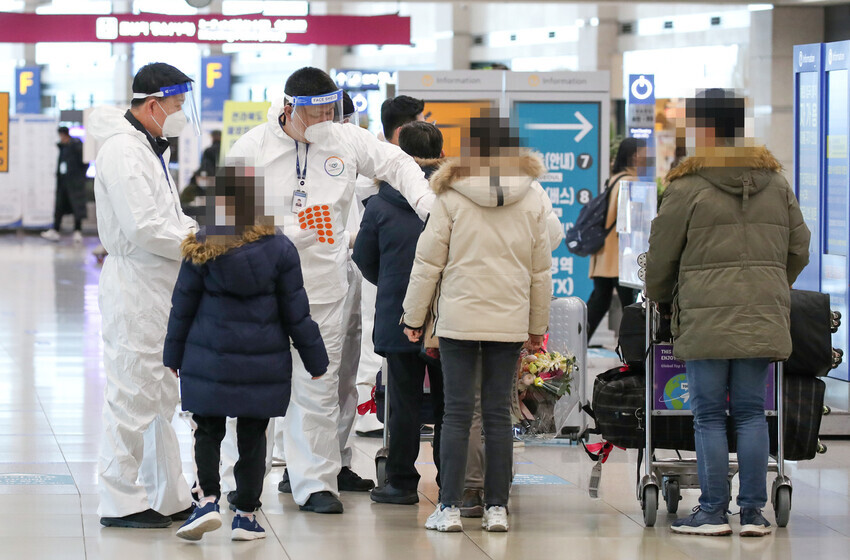hankyoreh
Links to other country sites 다른 나라 사이트 링크
S. Korea’s daily caseload dips to 300s but could erupt again at any time, authorities warn

South Korea’s third wave of COVID-19 appears to be subsiding, but the situation still demands caution, disease control authorities warn.
With 44% of confirmed cases over the past two weeks traced to “contact with a previously infected person,” a new wave could erupt again at any time. The World Health Organization (WHO) rated the global risk associated with variants of the COVID-19 virus as “very high.”
South Korea reported 386 new cases on Jan. 19. The number remained in the 300s for a second straight day after dipping below 400 for the first time in 54 days on Jan. 18. The average daily caseload was 468.3 from Jan. 13 to 19.
But disease control authorities warned that the decline in new cases could be reversed as people let down their guard and new outbreaks erupt. In a Jan. 19 briefing, Lee Sang-won, director of the epidemiological analysis team for the Central Disease Control Headquarters (CDCH), explained, “Our concern is that the information about this decreasing trend could send the wrong signal and lead people to exercise less caution.”
The message is that with a rising number of infections traced to daily interactions, the introduction of new variants of the virus, and seasonal factors associated with winter, the potential for another wave of COVID-19 cases is very high. Indeed, fully 43.8% of cases diagnosed over the two weeks from Jan. 6 to 19 were traced to “contact with a previously infected person,” a category referring to transmissions involving four or fewer people.
The same day, the CDCH reported the WHO as having rated the global risk associated with COVID-19 variants as “very high.” A variant discovered in the UK was confirmed to be more transmissible, although this did not affect the severity of symptoms. Lee said, “Our biggest concern is that high transmissibility will mean more cases, which could lead to more people dying.”
“If only to manage severe cases, a decrease in new cases is unavoidable, and we have determined that disease control management needs to be stepped up to that end,” he explained.
In connection with this, the South Korean government plans to extend a ban on arrivals from the UK to Jan. 28. Additionally, international passengers arriving from Brazil will be required to submit confirmation of a negative polymerase chain reaction (PCR) test as of Jan. 25, in addition to undergoing testing at their quarantine facilities. Arriving travelers are to be quarantined until they receive a confirmed negative result. The same measure has been applied since Jan. 12 to travelers arriving from the UK and South Africa. Eighteen cases of the variants originating in the UK, South Africa, and Brazil have been confirmed in South Korea to date.
By Suh Hye-mi, staff reporter
Please direct comments or questions to [english@hani.co.kr]

Editorial・opinion
![[Column] Life on our Trisolaris [Column] Life on our Trisolaris](https://flexible.img.hani.co.kr/flexible/normal/500/300/imgdb/original/2024/0505/4817148682278544.jpg) [Column] Life on our Trisolaris
[Column] Life on our Trisolaris![[Editorial] Penalties for airing allegations against Korea’s first lady endanger free press [Editorial] Penalties for airing allegations against Korea’s first lady endanger free press](https://flexible.img.hani.co.kr/flexible/normal/500/300/imgdb/original/2024/0502/1817146398095106.jpg) [Editorial] Penalties for airing allegations against Korea’s first lady endanger free press
[Editorial] Penalties for airing allegations against Korea’s first lady endanger free press- [Editorial] Yoon must halt procurement of SM-3 interceptor missiles
- [Guest essay] Maybe Korea’s rapid population decline is an opportunity, not a crisis
- [Column] Can Yoon steer diplomacy with Russia, China back on track?
- [Column] Season 2 of special prosecutor probe may be coming to Korea soon
- [Column] Park Geun-hye déjà vu in Yoon Suk-yeol
- [Editorial] New weight of N. Korea’s nuclear threats makes dialogue all the more urgent
- [Guest essay] The real reason Korea’s new right wants to dub Rhee a founding father
- [Column] ‘Choson’: Is it time we start referring to N. Korea in its own terms?
Most viewed articles
- 1New sex-ed guidelines forbid teaching about homosexuality
- 2OECD upgrades Korea’s growth forecast from 2.2% to 2.6%
- 360% of young Koreans see no need to have kids after marriage
- 4[Column] Life on our Trisolaris
- 5Months and months of overdue wages are pushing migrant workers in Korea into debt
- 6Korean government’s compromise plan for medical reform swiftly rejected by doctors
- 7[Guest essay] Maybe Korea’s rapid population decline is an opportunity, not a crisis
- 8S. Korea discusses participation in defense development with AUKUS alliance
- 9Presidential office warns of veto in response to opposition passing special counsel probe act
- 10Inside the law for a special counsel probe over a Korean Marine’s death